A Defence of Resident Evil Survival Horror Controls.
By Yummylee 64 Comments
This... admittedly seems a tad random and almost comes across as a sort of reactionary post to something recent that's been making the waves throughout the interwebs. In a sense it... is sort of reactionary, but rather to the general sentiment regarding the classic Resident Evil games and how they control. Most importantly originating from the consensus of how widely accepted both RE4 & RE5 play, despite RE4 in particular featuring the exact same tank controls as the classic games. I've also always thought of it as a little unfair to how restrictions like not being able to move & shoot in those games is admissible and is commonly justified with such reasoning as ''you don't need to move & shoot'' for example, by @brad in particular.
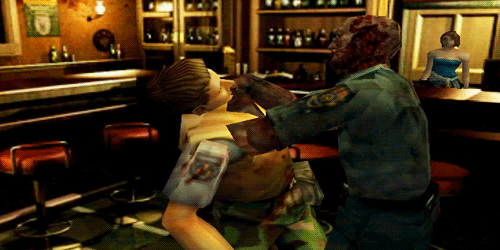
Which of course is 100% true. RE4 is a game that is specifically designed around the fact that you cannot simultaneously move & shoot, only that's similarly how I've always viewed the controls for the original games. I think one of the main fallacies is I would imagine most people often tend to compare the new and the old too directly; because RE4 is a shooter, people then judge the older games and how they control as if they are also shooters which... well, they're not. They're games that feature the act of shooting, but they're not really shooters.
Anywhoo, a blog like this is something I've wanted to post for like forever, but laziness and all that... Weirdly enough--and this isn't the first time--what brought about me actually finally writing up my thoughts on the matter in detail was as a forum response, specifically to @believer258. Only this time I figured I should actually reformat my post, expand it a wee bit, and place it up as a blog.
So... woolah... ?
First Things First
Now, for reals, I would never classify the controls of classic Resident Evil games as being... accessible; they're very unorthodox to say the least. Despite that, because the original games' were rather slow paced and emphasised atmosphere and exploration over most facets, I never felt like the controls were much of a hindrance. The older games may still have had plenty of combat, it was all very rudimentary; most bosses for example primarily required that you simply run away, shoot, run away, shoot ect.
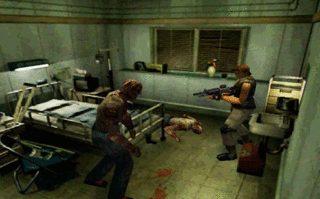
The basic source of challenge within the games was that you had to decide between whether it's best using up ammo to kill this hypothetical zombie rather than try to run away. Your attempts at trying to get through a combat encounter without actually engaging in combat might mean you get damaged along the way, due to the intentionally claustrophobic environments, but... hey, you gotta adapt! And that's basically the core appeal for me and survival horror in general: being forced to adapt because you've run low on supplies and having to then think outside of the box and mix up your strategies. It's why I'm also a huge fan of The Last of Us not purely for its story, but because it also had some rather punishing gameplay that focussed on ammo conservation and improvisation. It's essentially what a modern-day survival horror game should strive to resemble, and that's predictably the reason why user-reception to the gameplay is rather mixed, given the nature of survival horror being a divisive one.
Boss battles admittedly tend to clash against certain philosophies regarding survival horror, by placing an enemy in front of you that must be killed to continue the game forward as opposed to giving you the chance to alternatively run away. But as abbreviated earlier bosses--in Resident Evil at least--are rather simple in design and instead exist more for spectacle and/or narrative purposes. Running low or out of ammunition is supposed to be a genuine fear, and should that happen in the midst of a boss battle... well, that would really kinda suck. It's a tricky system to balance, though Resident Evil games usually offset this potential nuisance by making sure there's likely to be additional ammo you can acquire somewhere--if not outside or near the boss arena--to beat it. Not the most elegant of solutions, but... whattayagonnado.
Camera Angles & The Why of Tank Controls
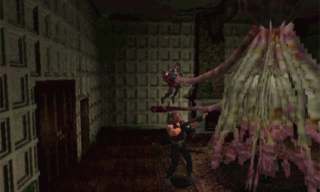
Camera angles existed for the purpose of accentuating the atmosphere and directing specific scares; it allowed a lot of freedom for the game to actually show you what they want (or don't want) you to see. However analogue control (for a time) didn't quite mesh with camera angles very well. Think the original Devil May Cry, which had camera angles but also allowed you more freedom of movement; it lead to instances of you running from one angle to the next and then having to awkwardly shift to pushing the stick in the opposite direction sometimes. Whereas with tank controls pressing up always made the character move forward for example, regardless of the angle. Though like I said this was only for a time, as with games like Onimusha 3 and the Outbreak games they had evidently figured that issue out, or at least smoothed it some so it wasn't as much of a frustrating hassle. In any case that is why I believe they stuck with the tank controls for so long even when analogues were introduced to controllers.
Now, there's also the complaint concerning camera angles that you can get blindsided by enemies that you couldn't see. But every enemy in a Resident Evil game had a tell, be it a squishy footstep or growl for example, so you would always know if something was close by. Plus from Resident Evil: Director's Cut onward you had auto-aim available, so even if you couldn't see the creature your character would always aim directly at whatever may be within the vicinity. As such, I've always thought that the camera angles never got in the way that much, and they greatly benefited in attributing to the atmosphere of the games a great deal, especially in the first and its remake. Whatever grievances camera angles may have dealt the gameplay, the cinematic direction of the environments more than make up for it.
EDIT: *One such example of a superb use of camera angles is amidst the original Resident Evil's painting puzzle room, which features a murder (!!!) of crows perched above. There's no music, no sounds beyond your character's footsteps and the sporadic ''caws'' of the crows. The angle is situated with the crows at the forefront, watching you from above. As you're going around pressing buttons the camera keeps a lot of its focus on the little shits, building tension as you await for if they should eventually start attacking. The way it's arched down with the crows looming above you gives a great visual metaphor of death and its eternal gaze upon you at that.
Overall with the way the angles present such a cinematic presence, it almost begins to resemble as if you're playing the game amidst a cutscene.*
Though ironically enough I see no reason why being able to move & shoot wasn't implemented into the main games. Outbreak: File 2 introduced such a concept and I think may very well have been the first of the franchise; it didn't drastically change the formula, but it was a nice touch that offered you a little more leeway in allowing you to slowly walk backwards while pulling off some handgun shots at whatever it is you're fighting. Though the enemies you encountered in File 2 were so damn fast to begin with that you were better off skedaddling all the same. Stupid zombie lions...
And Hey, It Could Always be Worse!
For as often as people like to complain about the Resident Evil games controls, they're really not too bad when put up against the many imitators and inspirations. Tank controls aside, Resident Evil's were still what I would genuinely describe as ''smooth''; they were always responsive and animated well--no worse than RE4--and games like RE3 and the remake in particular have a surprising amount of speed to them.
Fear Effect
Though the Fear Effect games for example even I think are rather clunky, which is ironic given that in these you can simultaneously move & shoot, and even have access to a 4-way directional evasive roll. However because you would often face against enemies that could shoot back (least during the beginning segments before demons and magic and shit is introduced), the tank controls weren't quite up to snuff I think. It did at least have a basic stealth system to it, which was outright necessary to utilise in certain levels like Disc 2 for the original. But nonetheless, the animations were somewhat lethargic and not always the most responsive. I still fucking adore the Fear Effect games mind you, particularly the second, but even I would have difficulty in trying to defend the combat. And yet weirdly enough I'm to believe @jeff actually quite enjoyed it...?
Dino Crisis
Funnily enough I would also consider Dino Crisis to be a little less than ideal as well. While the first in particular is aptly described as ''Resident Evil with dinosaurs'', controls-wise the movement is a little more sluggish; primarily by way of how there's a slight build-up when you start to run, which differs from Resident Evil in that once you begin running you are off. Though that's not my primary issue with the gameplay, and unfortunately enough it's actually related to its one defining element that was to set it apart from Resident Evil -- being the dinosaurs.
As you may expect, the dinosaurs are pretty bleedin' fast. In fact they're even faster than you, which was never the case in Resident Evil beyond maybe boss monsters. They're also incredibly strong and your starting pistol has like zero stopping power and a comically slow firing rate. As such, whenever a dinosaur enters a room (it was often randomised) you were in some deep dinosaur doodoo. Of course, that's the point, but the speed and overall aggression of the dinosaurs simply felt they were a bit too much for the controls to handle. You were at a pretty significant disadvantage, much more so than in a Resident Evil game. I have completed Dino Crisis however--twice in fact--but I don't think its combat is quite as well designed as Resident Evil. Because again, the enemies in Resident Evil are typically slow & sluggish, and even the zombie dogs of the series you were always just ever-so-slightly faster than.
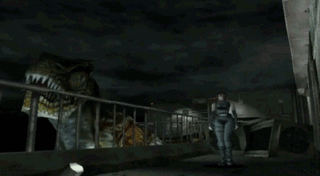
Though hey, at least you can move & aim in Dino Crisis! No, not move & shoot.... move & aim, which I always thought was a rather peculiar inclusion; not like it actually provided any mechanical benefit, either. With all that said, I'm admittedly not so much a fan of Dino Crisis for many other reasons besides. Like how the game takes place pretty much exclusively in drab, boring facility buildings. This was their first survival horror game that tried out 3D backgrounds as opposed to pre-rendered, which while it allowed the camera to sometimes pan alongside you, it meant the environments lacked the superb amount of detail pre-rendered offered. Plus, again, there was very little variety to a lot of it. As the plot went along you simply just kept moving on from one drab facility to another. And dinosaurs in general I never thought were as interesting nor certainly unnerving as the monstrosities that hounded the heroes of Resident Evil. So I'd say without reservation that I actually greatly prefer its more action-orientated arcade-shooter sequel. Jeez, you can't even walk in that game! It's probably about as drastic of a divergence as what Resident Evil saw when RE4 came about.
Silent Hill 2
Another fine example would be Silent Hill 2, which frankly controls like salty garbage. Even by Silent Hill standards SH2 was especially clunky -- even the original I'd say controls better. Its melee combat was practically broken; the difficulty with which it takes James to try and swing that bloody wooden stick you'd think he was suffering from a whole series of mental cognitive problems beyond the... y'know, psychosis and stuff. It would constantly keep bouncing off of stuff and was just a total mess to try and utilise. Fortunately firearm ammo was practically raining from the skies on the Normal combat difficulty setting, which I'd gather is the developers having a little self-awareness that their combat is even more clumsy than it should be.
Oh! Conclusion!
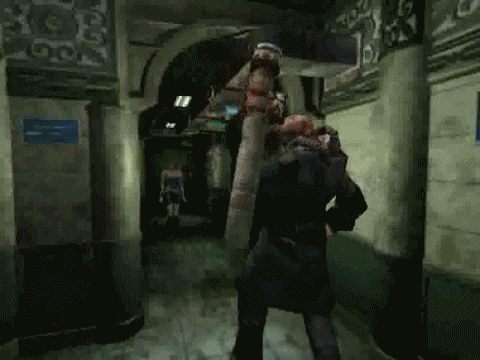
So, such is my explanations & justifications of why I think those old zombie games--for what they are--controlled perfectly fine. Now, I'm not demanding that everybody should now be inclined to agree with me, just that hopefully some may at the very least better understand why those old games continue to have their fans so many years onward. After all like I mentioned above, one of the core concepts of why I liked playing Resident Evil games of old was because of the fear of noticing your supplies dwindle and being forced to improvise. Even if because of their age there wasn't that much to improvise with beyond running away... still, early days and all that. Though of course there's still the B-movie storytelling and grotesque monster designs, they also certainly add to the appeal.
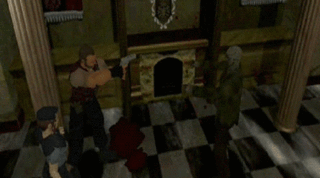
That very gameplay scheme is why I really enjoyed the Outbreak games (well, the first one anyway), because it felt like it was the culmination of what Resident Evil was about but for a more modern era. It had degradable melee weapons for example and randomised zombie encounters, alongside analogue control & being able to move & shoot as I previously mentioned. And of course online cooperative multiplayer, even if we didn't have access to it over in Europe for the first game. Though even whence it was belatedly brought over with the sequel, I myself lacked the components for online play anyway, so... That's part of the reason why I prefer the original, as the sequel was made to be drastically more difficult to account for the introduction of online play; playing it solo was truly something of a nightmaaaaarrrrre.
Really, it's not like I specifically enjoy tank controls and think they're better than regular analogue control, I just (usually) have no problem with them. Camera angles, however, I am definitely in favour for and think they legitimately have merit in building atmosphere, especially in conjunction with pre-rendered backgrounds. It's a style I wish we could one day see if only a slight resurgence amidst the indie scene. If not, hopefully The Evil Within will then at least continue the slowly encroaching modern-day survival horror renaissance...
I swear, my anticipation for that game to live up to what it's selling itself as I'm finding to be far more distressing than just about any horror game >_>...
Outro Music?!
